Riots
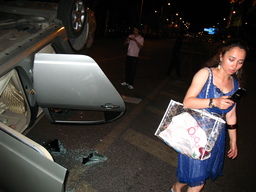 URUMQI, China
URUMQI, China
July 6, 2009
I lied about my race and religion to save my life last night.
What rumors we heard in the early evening sounded unlikely. Nisagul's flatmate called to warn her. There had been incidents down in the Er Dao Qiao and San Xi Hangzi areas. Some sort of shootings involving young Uighur men: don't go out.
I dismissed the call immediately. Over several recent years living in this city I'd seen plenty of petty crime, but had never seen anything involving a shooting. How bad could things really be out there?
I was spending what was supposed to be my last night in town with friends. It was meant to be not only my last night in Urumqi, but was also supposed to be closing night for Uncle Bob's Cafe, a place in central Urumqi popular with foreign English teachers. A couple westerners were in the front bar area; I was in a back room with several local friends. When the call came in, we were in the middle of a few rounds of Indian poker. A playing card was plastered to each of our foreheads; we were chuckling and grinning at each other, trying to guess the number of our card.
I called Meenday at the TV and radio broadcasting station to ask about these rumors. She was about to go on air to read the 10:00 nightly news in Mongolian.
"Hey, have you heard anything about a bunch of young Uighur men and problems in the city?", I asked.
"No. What's happening?", she replied.
"Oh, I don't know. Probably nothing. I just heard some rumors. I haven't seen anything myself. If you all at the station don't know anything, then I'll assume it's nothing."
That was the last contact I would have with Meenday until she came to the police station for me the the next day.
Some minutes later, an English teacher from New Zealand, Carl, stepped into the back room of the cafe where we were playing cards.
"There are protests going on outside. A pack of young men just ran past the front of the cafe. They were shouting out, 'Uighur! Uighur!...', something."
As with the phone call from Nisagul's roommate, I tried to find some reason to dismiss what Carl just said. But, even if he didn't understand what these protesters were chanting beyond the name of their ethnicity, I knew that any sort of protest in China--let alone Urumqi--must be significant.
I stepped outside to take a look around, myself. The front of the cafe seemed fine. Walking down the block towards People's Square there seemed to be more people out than normal. The usually busy streets had little traffic. I noticed that taxis weren't running. Nor were any public buses. An occasional emergency vehicle passed through the intersection where I stood, about a block southeast of People's Square. I didn't see any signs of protest.
I went back to the cafe to tell my friends what I saw. We tried to carry on, but nobody was really interested in continuing to play cards. When Carl came to the back room yet again to tell us that a second wave of protesters had just passed the front of the cafe we contemplated whether to stay.
It was coming up on 9:00 P.M.. The cafe was filling up with teachers from the nearby school, English First. I realized that if we didn't leave soon, we would all be stuck spending the night together in a small cafe. Everybody I had been playing cards with was local to Urumqi--I was the only foreigner. Most of my friends and I decided to try walking back home.
Lena and Zhi Shuang lived in places on the north side of town. We bid them farewell just off of People's Square. Shamsiya and her sister stayed on at the cafe. That left three: Rahila, Nisagul, and me to make our way to the south side of the city. I was staying with Meenday out by the broadcasting station, a location well to the east of where Nisagul and Rahila live. Both of them have apartments off of Xin Hua Nan Lu. It would be out of my way to go along with them, but I still felt that it would be best to escort each of them home.
We walked along the first road off the cafe running south. In the city center, aside from the light traffic and groups of people standing around gawking, the situation seemed relatively normal. It was only as we walked further south that we began to get a sense of the situation we were heading into.
"What's that smoke, off in the distance?", Nisagul gestured toward the southwest.
"I don't know. Let's just keep along this road. If we continue on due south we'll bypass that area by a few blocks.", I suggested.
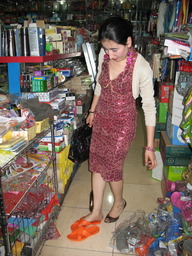 Though not yet late, most shops were shuttered, metal gates drawn across each storefront. Rahila stopped into one of the few shops still open to buy a pair of plastic sandals. She was dressed for a night out, wearing a pair of sparkling slippers with high heels. We were yet unaware what was going on, so were still cracking jokes. As Nisagul and Rahila inspected flip-flops, I contemplated a freezer on the other side of the store. "Hey, they've got my favorite ice cream: Yili brand Mongolian yoghurt. You two want ice cream?"
Though not yet late, most shops were shuttered, metal gates drawn across each storefront. Rahila stopped into one of the few shops still open to buy a pair of plastic sandals. She was dressed for a night out, wearing a pair of sparkling slippers with high heels. We were yet unaware what was going on, so were still cracking jokes. As Nisagul and Rahila inspected flip-flops, I contemplated a freezer on the other side of the store. "Hey, they've got my favorite ice cream: Yili brand Mongolian yoghurt. You two want ice cream?"
I paid for three ice cream bars and we continued along out of the store. After walking about seven or eight minutes we arrived at an intersection flanked by riot police. Soldiers wearing helmets and camouflage fatigues were ringing the crossroads, facing outwards. They held batons and large clear shields. Nobody was approaching the intersection. There didn't seem to be unrest from any direction. I said that we should keep going.
Nisagul was happy to follow along with me. Rahila balked. I approached the intersection; none of the people standing guard seemed to care.
"Come on, Rahila!", I called out. "If we just hang around here we'll just be stuck outside all night."
Rahila reluctantly tagged along, but when it became clear that three people were trying to pass, the soldiers denied us.
We tried another road, forking off from that intersection to the west. We managed to make it through a few blocks before coming to Sheng Li Lu, the next north-south arterial. Sheng Li Lu would have been a logical route to follow down to see Nisagul and Rahila home. However, the gauntlet was even heavier at that intersection. Troops waved us through to continue along to the west. They refused to let us turn south along Sheng Li Lu.
"It's okay," Rahila said. "I know some back roads in this area."
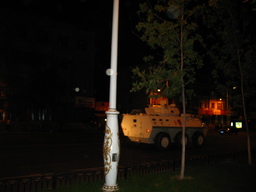 Rahila did know the area. We walked through winding streets for about ten minutes. Passing between old buildings laid-out at odd angles we found ourselves in the heart of San Xi Hangzi. The neighborhood couldn't have been more than a couple blocks away from a major road, Renmin Lu, but I had seldom gone through this area. All the signs on the street and all people's conversations were in Uighur. New buildings constructed alongside old ones partitioned the paths into a maze. Rahila stopped once or twice to ask directions; we eventually found ourselves on the major north-south boulevard of Xin Hua Nan Lu.
Rahila did know the area. We walked through winding streets for about ten minutes. Passing between old buildings laid-out at odd angles we found ourselves in the heart of San Xi Hangzi. The neighborhood couldn't have been more than a couple blocks away from a major road, Renmin Lu, but I had seldom gone through this area. All the signs on the street and all people's conversations were in Uighur. New buildings constructed alongside old ones partitioned the paths into a maze. Rahila stopped once or twice to ask directions; we eventually found ourselves on the major north-south boulevard of Xin Hua Nan Lu.
"I never thought I would see anything like this in Urumqi," Nisagul murmured offhandedly, as we started heading south. In addition to the riot police flanking major intersections, we'd passed every type of emergency vehicle and several convoys carrying soldiers. "The only thing I haven't seen yet is a tank."
It was walking south along Xin Hua Nan Lu where we started to see the aftermath of what had happened that evening. "Hey, over there," I gestured to Nisagul as we reached the intersection with Tuan Jie Lu. "There's your tank."
The military presence was huge. Convoy upon convoy streamed through every intersection. Many carried troops. I asked Nisagul what one of banners in Chinese said. She translated it as, "We will sacrfice our lives for the freedom of our country."
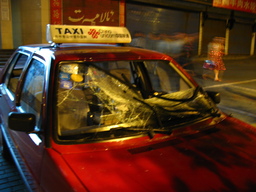 Xin Hua Nan Lu was mostly clear as we walked south. What vehicles were moving along the road were all either military or police. The vehicles that weren't moving were utterly destroyed. We passed a taxi with its windshield smashed through. Whoever occupied that vehicle was long gone. The meter was yet ticking, having reached an impossibly high fare of 65 yuan. All the glass along the right side of a bus running route 7 had been smashed out. On the street beneath the back door exiting the bus were the remains of a round cake box with frosting and cake smeared about the ground.
Xin Hua Nan Lu was mostly clear as we walked south. What vehicles were moving along the road were all either military or police. The vehicles that weren't moving were utterly destroyed. We passed a taxi with its windshield smashed through. Whoever occupied that vehicle was long gone. The meter was yet ticking, having reached an impossibly high fare of 65 yuan. All the glass along the right side of a bus running route 7 had been smashed out. On the street beneath the back door exiting the bus were the remains of a round cake box with frosting and cake smeared about the ground.
The further south we went, the worse it got. We were encountering more and more cars that were completely flipped-over. Nisagul looked closely at the scattered effects of a couple of the overturned vehicles to see if she could tell whether the occupants were Han Chinese or Uighur.
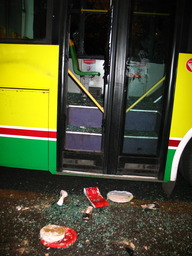 "I think the people in these cars were Han Chinese," Nisagul determined.
"I think the people in these cars were Han Chinese," Nisagul determined.
As we neared the street Rahila lives on, I mistook one of the northbound vehicles in a convoy for a snowplow. "I guess they have to use whatever they can in this situation," I thought to myself. Upon taking a closer look I realized that the vehicle had a turret with a machine-gun on top. Whatever was on the front might have been used for shoveling, though I'm sure it wasn't meant for scooping snow. It might have been used as a battering ram. I don't know just what it was, but it was not a snowplow.
I noticed one of Urumqi's bright yellow public buses approaching us off in the distance. I was surprised that any public transit would still be running through the carnage. Then I saw three more buses following along, behind. When they passed by, we saw that there were no ordinary passengers inside but large tires and other supplies. Route 109 had been commandeered into service to deal with the crisis.
Nisagul and I saw Rahila off to her family's apartment. The small neighborhood street where Rahila lives had its own heavy police presence and riot police lined up along the nearest intersection. It was no problem to pass through that cordon and to then cut back across to walk over to Nisagul's apartment on a nearby block.
Along the stretch between Nisagul's and Rahila's homes we walked past a greater number of destroyed storefronts. A shop we often frequented over the days while Nisagul and I were staying with Chris and Mary had its glass facade completely smashed out--yet was still open for business. A restaurant advertising donkey meat seemed to have attempted to barricade itself. Tables and chairs were stacked in a high pile just inside a smashed out window.
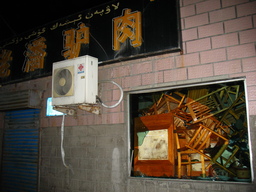 As we walked up the steps to Nisagul's apartment block we passed a young woman sitting at the top of the steps. Her face was in her hands. She was sobbing. I walked with Nisagul upstairs, several flights up to her apartment. Nisa's flat is small: she shares a room with another Uighur girl. In addition to her flatmate, there was another guest there that evening.
As we walked up the steps to Nisagul's apartment block we passed a young woman sitting at the top of the steps. Her face was in her hands. She was sobbing. I walked with Nisagul upstairs, several flights up to her apartment. Nisa's flat is small: she shares a room with another Uighur girl. In addition to her flatmate, there was another guest there that evening.
Phone service had been irregular the whole night. SMS text messages seemed to be getting through after an hour-or-so of delay. Some people out on the streets appeared to be having conversations with mobile phones pressed to one ear, but neither Nisagul's nor my phone was working. I had tried calling Meenday several times after leaving the cafe to let her know that I was considering staying at Nisagul's apartment. After I repeatedly couldn't get through to Meenday I decided that I would walk to the broadcasting station.
On the way downstairs from Nisagul's apartment, I considered swapping the memory card from my camera. I had a spare card in my bag. I'd snapped many photos of the destruction I'd seen out in the streets. But, the stairwell was dark with few working lightbulbs. I realized that if I dropped anything in that dark stairwell--a battery, a memory card--it would be nearly impossible to find it again. I decided to leave the card in the camera. That would be my undoing.
If it were possible to walk the most direct route from Nisagul's home to the broadcasting station, it would probably take about 35 minutes on foot. I would first cut through the campus of Xinjiang University, cross Yan An Lu, then pass through the grounds of Xinjiang Public Broadcasting. However, even in ordinary times, the station never allows people to cut through. Additionally, many rumors had been flying about the streets as to who was behind the riots. One rumor was that the violence had begun with students from Xinjiang University. I didn't know what to believe that night--and rather doubted that particular rumor--but figured it best to avoid cutting through campus, all the same.
The only alternate route was the long way around both the university and the station. Heading to the regional bus station, then turning and following the road along the amusement park would take me across Bahar Lu, a long, curving road. That route could connect me to a road running to the broadcasting station.
I walked through back roads up to the main road out front of Xinjiang University. The photos I shot were of grimmer scenes. Walking along Sheng Li Lu, I found the storefronts of all the Chinese restaurants were completely destroyed. A Szechwanese place that Tiffany and I used to frequent, directly across from my old apartment, had its windows smashed into enormous shards of glass.
When I arrived at the bus station, the intersection of Sheng Li Lu and Bahar Lu, I found a huge presence of riot police. Despite the chaos, I decided that as long as nobody stopped me I would continue on. I took a path keeping as far away from the riot police as I could, then continued walking along past the amusement park. I wanted to get home. There was really nowhere else to go.
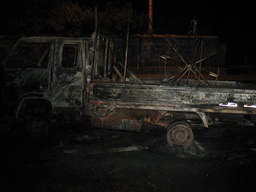 The scenes I passed along the street were worse and worse. City buses stranded askew in the street now had not just their windows smashed out but had been set ablaze. Some vehicles were still smoldering as I walked by. One had flames dancing about the wheel well, which seemed to me an odd place for a fire to burn.
The scenes I passed along the street were worse and worse. City buses stranded askew in the street now had not just their windows smashed out but had been set ablaze. Some vehicles were still smoldering as I walked by. One had flames dancing about the wheel well, which seemed to me an odd place for a fire to burn.
When I rounded the bend to the gas station I saw the staging area for the riot police. Hundreds of officers were lined up in squadrons: helmets surrounding each head, a clear shield in one hand, a baton in the other. The canine corps was out too, several dogs ready for action.
There was no other route back to the broadcasting station. I continued walking along the edge of the road, in plain view of hundreds of riot police lined up in formation. My guess was that the squadrons at the gas station were providing support for the riot police at the intersection I had just passed through, next to the bus station. Nobody stopped me.
I only stopped walking when I saw the corpse. There were a dozen-or-so people nearby, but nobody was paying much attention to the body. The corpse appeared to be of a middle-aged Uighur man. He was lying in a heap of ashes, though didn't appear burnt himself. Though he was clearly dead, the thing that struck me as most wrong about the situation was that his clothes were covered in cinders. Shouldn't somebody tell him to brush all that off?
The area I had arrived at was Sai Ma Chang, a Uighur neighborhood. The body was lying not far from the entrance to a wide area of narrow lanes, shoddy apartment complexes, and old earthen houses. There had been odd clusters off people hanging out throughout the city. The group of people lingering near the front gates to the compound were all ethnic Uighurs.
I was stupified. "What happened?", I asked in Uighur, to the people closest to the body.
"What happened? They're killing Uighurs," was the response from the lady I'd blurted my question out to.
"I need to get through to the TV and radio station. Can I keep on going along this road?" I pointed further down Bahar Lu.
"No," she replied, simultaneously shaking her hand and gesturing further along the road. "That's where the killing is happening."
A crowd had quickly formed around me. About 35 Uighurs, mostly men, were all looking at me. They were listening to my every word. Other people began asking questions and voicing suspicions.
"Are you Han Chinese?", one voice yelled at me.
"I'm a foreigner," I responded. "And I'd really like some help tonight. Is there any sort of a hotel or other place I can stay around here?"
Somebody else replied: "You can cut through the residential area. There are lanes that will eventually lead you out to the broadcasting station. But you'll have to tell people along the paths that you are Uighur. There are several checkpoints. People will stop you. They're not going to let you through unless you're Uighur."
"But I'm not Uighur. Can somebody accompany me?", I asked.
One of the men closest to me then asked if I was Muslim. I didn't lie outright but couched what I said in specific words to insinuate that I was:
"Naturally. As-salaam-alai-kom."
Another woman in the crowd yelled out, pointing at me:
"He's not a foreigner. He's Chinese!"
"What is your father's ethnicity!", a man in the crowd demanded.
I might have hedged my responses before, but at this point I figured it was best to straight-out lie. A mob of people in the middle of a riot were yelling at me. There was no point in trying to elaborate on the full nuances of my background.
"My mother is American," I said, truthfully. Then, I fibbed: "My father is Uzbek. That's how I have some ability with the Uighur language."
The mob seemed to accept this. Several other questions were shouted my way simultaneously. I chose to answer the one which I thought would best change the topic: "Did you see many police outside?"
I answered truthfully that I had walked past hundreds of riot police lined up near the gas station just down the road. I repeated that I was hoping to get to the area of the broadcasting station. I thanked everybody for warning me against walking into an area where people were being killed. And to get as far away from the mob as quickly as I could, I bid them farewell and told them I would take their advice to proceed through the back streets of this old quarter.
I walked off the main street, through a massive metal arch, away from the mob, and into the old neighborhood.
I tagged on to the first man I saw who was also walking in the same direction. I didn't know whether he'd been in the crowd and had heard my spiel, but I figured it would be best to have anybody-at-all accompany me along.
I repeated my story; he seemed willing to go along only so far with me. "The Uzbeks and Uighurs don't really get along," he told me. "Just keep on going and tell people that you're Uighur whenever they stop you." He walked off in another direction.
I must have walked past one of the checkpoints. Or perhaps people from the mob at the entrance had followed me inside. Wherever they came from, I glanced over my shoulder at one point to find three people following me, all carrying some sort of long, improvised cudgel. One held a metal pipe. Another held a slab of lumber. The third was holding some white cylindrical piece of plastic, perhaps a PVC pipe. I had just happened to turn when they were about five paces behind me. As with everybody else around the compound, I addressed them in Uighur: "Hello. How are you all doing?"
I repeated the basics. I'm a foreigner. I don't know what's going on. I'm trying to get to the TV station. Can any of you help me?
While speaking with them, another group of four Uighur men walked by. One had fair English, it turned out. I left the three who had come up from behind me with bludgeons and glommed onto the group with the English speaker. I figured it would be best to keep my conversation in that language and have him play interpreter for everybody else. My ability speaking Uighur was far better than his ability in English, but I reckoned that having him be the one to articulate my words fluently could help smooth over any potential run-in with other people in the quarter.
We first made the inavoidable chit-chat. "Oh, you are a student, then? Your English is very good. Which university do you study at?"
"You should stay the night here in one of these homes," the man with fair English quickly offered. A safe place to stay for the night sounded fine to me. But I was afraid not only of being slaughtered out on the streets. I knew that my story of being Uzbek wouldn't survive the night. A couple people had already asked me for some sort of identification card to prove that I wasn't ethnic Chinese.
All of us stepped into the stairwell of the nearest apartment block. I clung close to the one who could speak English. The remaining men fanned out, running up the stairs to knock on all of the doors. People were certainly at home behind those doors--we had seen several leaning out from their windows on our way in. However, nobody let out any sound. Nobody opened their door to our repeated knocking and pleas for assistance.
Then, the electricity cut out. The five of us were left standing two floors up the stairwell in darkness.
We walked down the stairs and stepped outside. From afar we could see that the military and riot police had begun storming the compound. It was the earliest part of the siege: none of the troops had advanced farther than just a few buildings down the road leading into the neighborhood. A tank was the action closest to us, the presence deepest into the compound. Whereas the model I had mistaken for a snowplow had an automatic machine-gun turret, two soldiers were atop this tank. It seemed not to be leading a charge in, but providing rear support for whatever operations were going on closer to the gate. Beyond the tank I could see formations of troops and riot police. Orders I couldn't understand were shouted out. They seemed to be moving from door to door in our direction.
"You must come and hide somewhere with us!" the four insisted.
They were offering me support, but I decided it wasn't wise to continue that evening with them. Whether I was Chinese had already been questioned a couple times. I was pretty certain that I wouldn't make it through the night with any group of people offering me haven. More questions would come up. My story would unravel.
I switched back into Uighur to tell them all that I would give myself up to the Chinese police.
"Don't do that! They'll kill you. They're killing Uighurs."
"Yes, but I'm a foreigner. I'll raise my hands up and call out in English. They won't hurt me, in-sha-Allah. All four of you must help yourselves now. May God protect you!"
I stepped away to move along to the apartment tower, walking through the shadows. The military presence had come about halfway down the road from where I stood, but that still left a fair distance between my location and the tank. I again contemplated taking the memory card out of my camera and again decided not to.
I held both of my hands up as high as I could and shouted out:
"Hello!"
Nobody responded. The soldiers atop the tank kept their backs to me.
I took two more steps forward.
"Hello!"
After repeatedly calling out and slowly pacing forward, the rear soldier atop the tank finally heard me. He turned and pointed his gun straight at me.
I changed my words but made sure to speak in English, which I hoped would temper whatever situation I had just brought myself into. "I'm a foreigner!", I yelled out. "Hello!"
The rear guard held his fire. He yelled something out in Chinese about the ground and gestured downwards with the barrel of his gun. That was enough for me to understand. I sprawled myself out on the ground, face-down on the dusty cement path.
Two other soldiers who had been flanking the riot police and going door-to-door with large guns ran up to me. Their guns cast out a greenish light. At the time, I thought that green was an odd color to use as a laser sight. With retrospect, I realize that the illumination was probably used for something else. The beam wasn't focused; it was probably just used as a flashlight.
"There's a foreigner, a foreigner!", they yelled out in Uighur.
I feigned lack of ability in any language other than English. At that point there wasn't a lot of speaking yet expected from my part. One of the soldiers gingerly rifled through my shoulder bag. Then both of them escorted me to the main road; I walked along with my hands still held high in the air.
Along the path out, one soldier frisked me and found my camera. As I walked up to the gate I saw more emergency vehicles had arrived at the intersection: mostly police vans--and another tank. The commander in charge of the operation was the only one out of uniform. He strutted about, wielding a huge baton and barking orders out in Chinese spoken with a thick Uighur accent. Upon being presented with my situation he yelled out:
"Who speaks English? Who here speaks English!"
I was ordered to take a few steps back into the compound. The riot police were lined up in a large block and seemed to be exiting the area. I was instructed to kneel down a few steps from the front line. The soldier flanking me to my left told me to place my hands on my head; I had still been keeping them high in the air. "We don't do it that way here... like this," the soldier gestured, patting his head.
The commander started yelling out again. He was ordering the riot squad to look at me. "Look at this man. Look at him! If any single one of you..."
I let out an involuntary groan and turned my head backwards to face the line of police and the commander behind me. The enormity of my situation had finally struck me. I was squatting in a prone position with my hands on my head and my back to hundreds of men with guns.
I didn't actually hear how the commander finished his address, but believe it was must have been, "If any single one of you slip up and shoot this foreigner, then you'll really be in trouble." I don't know how else he could have finished his sentence that would have left me alive.
I was brought to my feet and the pictures I'd shot on my camera were shown to the commmander. "Mmm-hmm. Mmm-hmm.", he grunted as the soldier who frisked me advanced each frame. I was again brought out to wait outside alongside the main road, not far from the corpse lying in ashes.
Standing near me were five other people who had also been brought out from the area. They were ethnic Han Chinese.
A couple of soldiers who claimed English ability tried to talk with me, but neither knew much more than, "What country are you from?" A soldier standing next to the second tank brought four bottles of water out from the inside of the closer tank. He offered one to me. I glugged it down immediately. I hadn't realized how parched my mouth was.
After standing around for some time, a minivan came to take away the ethnic Chinese who had been rescued from the area. One of the five offered the commander a cigarette, which he declined with a heavily accented, "Xie xie."
Not long after the Han who had been rescued from the area were driven off in the minivan, I was hustled into a large police van with seven or eight other men in uniform. There was plenty of room, but the officer in the seat next to me sat deliberately close, leaving me no room to wiggle about. I realized that I was occupying a window seat: probably not the best position to have when driving through a riot.
The scenes on the remaining stretch of Bahar Lu were the worst. I saw more burnt-out buses. We drove past another neglected corpse that must have died a different death--this one was lying in a large pool of blood.
We drove north up Tuan Jie Lu and actually passed the broadcasting station where I was trying to make it back for the night. It was clear that the commander had taken issue with what photos I had on my camera so I didn't think they would let me off anywhere other than at some police station. Still, as we passed by, I did alert the driver that we were now at the broadcasting station. No such luck getting off that easily; he kept on driving.
Though not as bad as Bahar Lu, things were bad along Tuan Jie Lu as well. Chinese-owned restaurants and shops had been completely smashed up. The thin metal gates which run along the median of Tuan Jie Lu (used to keep people from crossing the street outside of intersections) had all been flipped down into one of the central lanes. Further along, as we drove around the beltway that loops within Urumqi there were other hazards to avoid. Bicycles had been thrown from overpasses onto the highway.
We finally reached our destination around 2:30 in the morning. We were admitted in through an accordion-style folding gate then drove into the grounds of the Nan Hu branch of the Public Security Bureau: central police headquarters for all Urumqi. Once inside, my drivers license and camera were confiscated. I endured an interview--which I again kept all in English. I slept on a couch in the Office of Foreign Affairs, under guard. Getting up, even to use the toilet, meant a bleary-eyed guard following along to watch me pee.
I knew that I was in trouble. Ironically, I felt that--at that moment--there could be no better place to spend the night than the heart of police headquarters.
 Though not yet late, most shops were shuttered, metal gates drawn across each storefront. Rahila stopped into one of the few shops still open to buy a pair of plastic sandals. She was dressed for a night out, wearing a pair of sparkling slippers with high heels. We were yet unaware what was going on, so were still cracking jokes. As Nisagul and Rahila inspected flip-flops, I contemplated a freezer on the other side of the store. "Hey, they've got my favorite ice cream: Yili brand Mongolian yoghurt. You two want ice cream?"
Though not yet late, most shops were shuttered, metal gates drawn across each storefront. Rahila stopped into one of the few shops still open to buy a pair of plastic sandals. She was dressed for a night out, wearing a pair of sparkling slippers with high heels. We were yet unaware what was going on, so were still cracking jokes. As Nisagul and Rahila inspected flip-flops, I contemplated a freezer on the other side of the store. "Hey, they've got my favorite ice cream: Yili brand Mongolian yoghurt. You two want ice cream?"
 URUMQI, China
URUMQI, China
 Rahila did know the area. We walked through winding streets for about ten minutes. Passing between old buildings laid-out at odd angles we found ourselves in the heart of San Xi Hangzi. The neighborhood couldn't have been more than a couple blocks away from a major road, Renmin Lu, but I had seldom gone through this area. All the signs on the street and all people's conversations were in Uighur. New buildings constructed alongside old ones partitioned the paths into a maze. Rahila stopped once or twice to ask directions; we eventually found ourselves on the major north-south boulevard of Xin Hua Nan Lu.
Rahila did know the area. We walked through winding streets for about ten minutes. Passing between old buildings laid-out at odd angles we found ourselves in the heart of San Xi Hangzi. The neighborhood couldn't have been more than a couple blocks away from a major road, Renmin Lu, but I had seldom gone through this area. All the signs on the street and all people's conversations were in Uighur. New buildings constructed alongside old ones partitioned the paths into a maze. Rahila stopped once or twice to ask directions; we eventually found ourselves on the major north-south boulevard of Xin Hua Nan Lu.
 Xin Hua Nan Lu was mostly clear as we walked south. What vehicles were moving along the road were all either military or police. The vehicles that weren't moving were utterly destroyed. We passed a taxi with its windshield smashed through. Whoever occupied that vehicle was long gone. The meter was yet ticking, having reached an impossibly high fare of 65 yuan. All the glass along the right side of a bus running route 7 had been smashed out. On the street beneath the back door exiting the bus were the remains of a round cake box with frosting and cake smeared about the ground.
Xin Hua Nan Lu was mostly clear as we walked south. What vehicles were moving along the road were all either military or police. The vehicles that weren't moving were utterly destroyed. We passed a taxi with its windshield smashed through. Whoever occupied that vehicle was long gone. The meter was yet ticking, having reached an impossibly high fare of 65 yuan. All the glass along the right side of a bus running route 7 had been smashed out. On the street beneath the back door exiting the bus were the remains of a round cake box with frosting and cake smeared about the ground.
 "I think the people in these cars were Han Chinese," Nisagul determined.
"I think the people in these cars were Han Chinese," Nisagul determined.
 As we walked up the steps to Nisagul's apartment block we passed a young woman sitting at the top of the steps. Her face was in her hands. She was sobbing. I walked with Nisagul upstairs, several flights up to her apartment. Nisa's flat is small: she shares a room with another Uighur girl. In addition to her flatmate, there was another guest there that evening.
As we walked up the steps to Nisagul's apartment block we passed a young woman sitting at the top of the steps. Her face was in her hands. She was sobbing. I walked with Nisagul upstairs, several flights up to her apartment. Nisa's flat is small: she shares a room with another Uighur girl. In addition to her flatmate, there was another guest there that evening.
 The scenes I passed along the street were worse and worse. City buses stranded askew in the street now had not just their windows smashed out but had been set ablaze. Some vehicles were still smoldering as I walked by. One had flames dancing about the wheel well, which seemed to me an odd place for a fire to burn.
The scenes I passed along the street were worse and worse. City buses stranded askew in the street now had not just their windows smashed out but had been set ablaze. Some vehicles were still smoldering as I walked by. One had flames dancing about the wheel well, which seemed to me an odd place for a fire to burn.